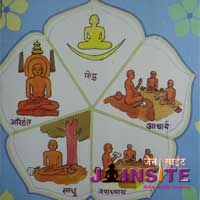Jain Philosophy (2) 13 – Tripadi (Three Pronouncements) Utpäd, Vyaya, and Dhrauvya Shraman Bhagawän Mahävir expounded and established the Jain philosophy and communicated it to his first disciple, Indrabhuti Gautam and ten other Ganadhars (Chief disciples), in three phrases, which constitute the foundation of the Jain philosophy; and lays down…
Jain Philosophy (2) 12 – Dhyäna (Meditation)
Jain Philosophy (2) 12 – Dhyäna (Meditation) Meditation in Jain Scriptures Meditation (Dhyäna) is the process of concentration of the mind on a single topic preventing it from wandering. We are always every moment in meditation; either virtuous or non_virtuous. This concentration could arise from intense passions like attachment, aversion,…
Jain Philosophy (2) 11 – Swädhyäy (Study of Self)
Jain Philosophy (2) 11 – Swädhyäy (Study of Self) Introduction The simple meaning of Swädhyäy is “to study.” The word Swädhyäy consists of two words, Sva and Adhyäya. Sva means self, and (soul is the self). Adhyäya means study. Therefore, Swädhyäy means a study of one’s own self. Reading, listening…
Jain Philosophy (2) 10 – Jain Concept of Devotion (Bhakti / Prayer)
Jain Philosophy (2) 10 – Jain Concept of Devotion (Bhakti / Prayer) In all religious traditions, prayer plays an accepted mode of communication between the devotee and the divine. A prayer is a pure dialogue between the devotee and the divine, and thus does not need nor require any material…
Jain Philosophy (2) 09 – Bhävanäs (Reflections or Contemplations)
Jain Philosophy (2) 09 – Bhävanäs (Reflections or Contemplations) Introduction Jain religion puts a significant emphasis on the thought process of a human being, as thought process put deepest impact on the human brain. A person’s behavior and his actions are the reflection of his internal thoughts. It is not…
Jain Philosophy (2) 08 – Virtues: Kshamä, Vinay, Saralatä and Santosh)
Jain Philosophy (2) 08 – Virtues: Kshamä, Vinay, Saralatä and Santosh) (Forgiveness, Humility, Straightforwardness and Contentment) The key to achieving a higher level of inner happiness is to get rid of all passions (Kashäya). The basic passions are attachment and hatred; we can subdivide them into anger, ego, deceit and…
Jain Philosophy (2) 07 – Practicability of Ahimsa (Nonviolence)
Jain Philosophy (2) 07 – Practicability of Ahimsa (Nonviolence) Ahimsa is cardinal principle of Jainism; the entire Jain ethical code has been laid down with a view of transforming this principle into actual practice. As a result, maximum importance has been attached to the observance of Ahimsa as a basis…
Jain Philosophy (2) 06 – Panchächär (Five Codes of Conduct)
Jain Philosophy (2) 06 – Panchächär (Five Codes of Conduct) Nänammi Dansanammi A Charanammi Tavammi Tahay Viriyammi Äyaranam Äyäro Ea Eso Panchahä Bhanio – Panchächär Sutra Knowledge, faith, conduct, austerities and vigor constitute the fivefold code of conduct Religion has two major aspects. One deals with the principles and…
Jain Philosophy (2) 05 – Vrata (Vows) for Sädhu / Sädhvi and Shrävak / Shrävikä
Jain Philosophy (2) 05 – Vrata (Vows) for Sädhu / Sädhvi and Shrävak / Shrävikä The word Vrata (Vows) is derived from the verb word “Vru” meaning to select. Therefore, the Vrata means the type of selection for renunciation. ‘Vrata’ is approximately translated in the English by word ‘vow’. Literally,…
Jain Philosophy (2) 04 – Ratna_trayi Moksha Märg (Threefold Path of Liberation)
Jain Philosophy (2) 04 – Ratna_trayi Moksha Märg (Threefold Path of Liberation) Threefold Path of Liberation (Ratna_trayi) The association of the soul with karmic matter masks the inherent qualities of the soul. Jain philosophy, asserts that a person obtains everlasting happiness when karma is completely removed from the soul. Jainism…
Jain Philosophy (2) 03 – Dharma and Its Significance
Jain Philosophy (2) 03 – Dharma and Its Significance Everyone has his or her own individual meaning of what religion is. To some it represents good conduct and humanitarianism, to others, meditation and philosophy, yet to others it may be about ceremonies and rituals. These are all various aspects of…

Jain Philosophy (2) 02 – Pancha Parmeshtis (Five Reverend Personalities)
Jain Philosophy (2) 02 – Pancha Parmeshtis (Five Reverend Personalities) Namaskär Mahämantra Namo Arihantänam Namo Siddhänam Namo Äyariyänam Namo Uvajjhäyänam Namo Loe Savva Sähunam Eso Pancha Namukkäro Savva Päva Ppanäsano Mangalänam Cha Savvesim Padhamam Havai Mangalam Namo Arihantänam I bow to Arihantas who have achieved enlightenment by overcoming inner enemies…

